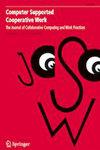多源领域迁移学习在癫痫诊断中的应用
IF 2.3
3区 计算机科学
Q3 COMPUTER SCIENCE, INTERDISCIPLINARY APPLICATIONS
Computer Supported Cooperative Work-The Journal of Collaborative Computing
Pub Date : 2023-05-24
DOI:10.1109/CSCWD57460.2023.10152684
引用次数: 0
摘要
癫痫是一种发生在所有年龄段的神经系统疾病,严重威胁身心健康。目前的研究存在两个问题。一个是公共医疗数据的数量有限。另一个是数据的分布是不同的,但是相关的。传统的机器学习方法不适用。而迁移学习方法在解决这两个问题上都表现出了良好的效果。本文提出了一种用于癫痫诊断的多源领域迁移学习方法MDTL。为了充分利用数据集的特定特征和公共特征,我们提出了一个领域特定特征提取器和一个公共特征提取器。为了增强数据,我们将信号转换成时频图进行旋转和裁剪。将三种类型的心电图时频图输入训练模型,并将训练模型转换为脑电图时频图。结果证实MDTL对癫痫的诊断是有效的。本文章由计算机程序翻译,如有差异,请以英文原文为准。
Multi-Source Domain Transfer Learning on Epilepsy Diagnosis
Epilepsy is a neurological disease that occurs in all ages and seriously threatens physical and mental health. There are two problems in the present study. One is the limitation of the amount of publicly available medical data. And the other is that the distributions of the data are different but correlated. Conventional machine learning methods are not applicable. But transfer learning method has shown promising performance in solving both problems. In this paper, a multi-source domain transfer learning method called MDTL for epilepsy diagnosis is proposed. In order to fully exploit the specific features and common features of the dataset, we propose a domain specific feature extractor and a common feature extractor. For enhancing data, we transform the signals into time-frequency diagrams to rotate and crop. The three types of electrocardiogram (ECG) time-frequency diagram are put to train model, and the model is transferred to electroencephalogram (EEG) time-frequency diagrams. The results confirm that MDTL is effective in epilepsy diagnosis.
求助全文
通过发布文献求助,成功后即可免费获取论文全文。
去求助
来源期刊

Computer Supported Cooperative Work-The Journal of Collaborative Computing
COMPUTER SCIENCE, INTERDISCIPLINARY APPLICATIONS-
CiteScore
6.40
自引率
4.20%
发文量
31
审稿时长
>12 weeks
期刊介绍:
Computer Supported Cooperative Work (CSCW): The Journal of Collaborative Computing and Work Practices is devoted to innovative research in computer-supported cooperative work (CSCW). It provides an interdisciplinary and international forum for the debate and exchange of ideas concerning theoretical, practical, technical, and social issues in CSCW.
The CSCW Journal arose in response to the growing interest in the design, implementation and use of technical systems (including computing, information, and communications technologies) which support people working cooperatively, and its scope remains to encompass the multifarious aspects of research within CSCW and related areas.
The CSCW Journal focuses on research oriented towards the development of collaborative computing technologies on the basis of studies of actual cooperative work practices (where ‘work’ is used in the wider sense). That is, it welcomes in particular submissions that (a) report on findings from ethnographic or similar kinds of in-depth fieldwork of work practices with a view to their technological implications, (b) report on empirical evaluations of the use of extant or novel technical solutions under real-world conditions, and/or (c) develop technical or conceptual frameworks for practice-oriented computing research based on previous fieldwork and evaluations.
 求助内容:
求助内容: 应助结果提醒方式:
应助结果提醒方式:


